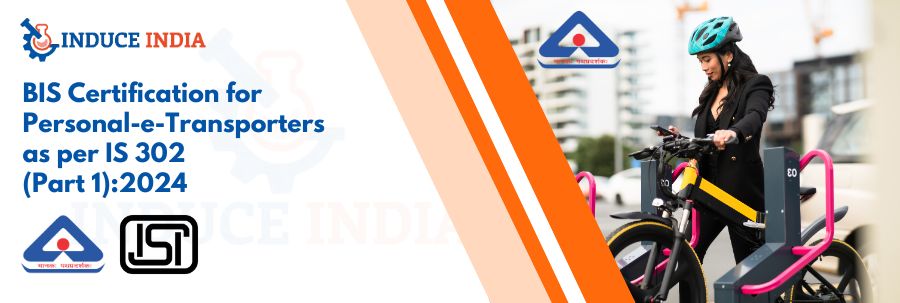Electric scooters, hoverboards, e-skateboards and mobile floating electric vehicles are increasingly becoming popular modes of transportation in India. They are convenient, eco-friendly, and affordable when travelling short distances. However, with their increasing popularity, people are concerned that devices should be safe for those who use them. Now this is where BIS (Bureau of Indian Standards) Certification comes in.
Personal e-transporters must receive certification of BIS to ensure that they are not dangerous during operation, that they are reliable, and that they comply with the electrical standards of India. This blog will focus on why BIS certification is mandatory and what standards it addresses, how the certification is done, and how the use of the standards by consumers as well as manufacturers is beneficial to them.
BIS Certification Overview
The Bureau of India Standards (BIS) is the national standards organisation in India that deals with maintaining quality and extremely rigid safety standards of the products. To the personal e-transporters, BIS certification guarantees that these products will not cause any accidents like electric shocks, battery fuses, fires, structural failures during operations, etc.
By using the BIS, manufacturers use it to prove that their products have undergone rigorous testing and meet the safety standards in India. This becomes imperative for consideration because the personal e-transporters use electricity as a power supply, as well as being vehicles of nuisance, transporting individuals on the shoulder of a highway, or the sidewalk in a town where the vehicles cannot be neglected in terms of safety.
BIS Certification Value to Personal e-transporters
Personal e-travellers are rather convenient and environmentally friendly, but when these are not made on a high standard, a significant threat cultivates. This may happen due to accidents/injuries or even fire due to electrical failure or short circuiting of electricity, overcharging of the electricity battery or even a flawed battery.
BIS certification assures that the product underwent tests concerning electrical safety, battery management, structural stability and overall operation of the product, in general. It serves to the consumers as an assurance to the buyers that the e-transporters purchased are safe and reliable. Certification provides credibility to the manufacturers, is in accordance with the rules and regulations of India as well and ensures ICT acceptance in the market.
Products Under the BIS Certification
BIS certification attracts a large variety of personal e-transporters, such as:
- Electric Scooters and E-Bikes: E-scooters and E-bikes are two-wheeled electric transport specifically developed as urban transport.
- Hoverboards and Self-Balancing Scooters: These are gadgets meant to assist personal navigation, but they have a built-in balancing system.
- E-Skateboards and Electric Unicycles: Smaller, more compact, they are launched with rechargeable batteries.
- Other Personal Electric Vehicles: Anything which runs on electricity to provide personal transport and comes under the regulations of I 302 (Part 1).
All these products undergo testing to verify their electrical safety, battery control, and quality of the materials and durability to guarantee that they are safe for the customers.
Applicable BIS Standards
In India, the most important standard of personal e-transporters is a general standard that is dedicated to electrical safety and referred to as IS 302 (Parts 1):2024. This requirement facilitates the design and production of the product in such a way that it will avoid electric shocks, fire outbreaks, and failure.
Additional significant criteria are:
- Battery Safety Standards: To ensure that lithium-ion or other batteries are used safely and charged.
- Material and Build Standards: Making of The frame and tyres, and wheels should be able to withstand everyday use and small scratches.
- Performance Standards: This involves the speed, braking and stability under normal operation.
These standards will result in the safety, reliability, and suitability of personal e-transporters to be used by the community.
BIS Certification Process
According to the BIS certification of personal e-transporters, it enables several procedures to be followed in achieving stringent discipline on the provision of safety and quality services:
- Application Submission: Manufacturers or importers are to file an elaborate application to BIS comprising technical peculiarities, design elaboration, and manufacturing procedures.
- Product Testing: The e-transporters are inspected at the laboratories, which are BIS-approved, electrically safe, battery integrity, insulation, braking, stability and durability. These tests are mandatory to verify the Indian safety operations of the product.
- Factory Inspection: In order to inspect the quality of control procedures, BIS can visit the manufacturing premises and ensure that it endeavours to provide consistent services.
- Certification Approval: When the testing and inspection are successful, the certification is given by BIS, and the manufacturer is free to print the ISI mark on the product. This seal is a guarantee to the consumers that the e-transporters are safe and compliant.
The advantages of BIS Certification
BIS certification causes several benefits to both the manufacturers and consumers, as well as to the entire market:
- To Manufacturers: Certification generates credibility, compliance with the regulations, and assists in earning the trust of consumers. It also raises the chances of retail approval.
- To the Consumers, it ensures safety, reliability, as well as long-term performance. Certified products tend to malfunction least and result in accidents.
- To the Market: Advocates for better quality of all products within the Indian e-transport market, lessening risks posed by non-quality imports or domestic manufacturing.
Consumer Safety Responsible Practices
Consumers ought to ride personal e-transporters properly, even with BIS certification. Always read the recommendations of the manufacturer and do not overcharge the battery, examine the tool to find out the wearable or damaged area, and wear protective equipment like a helmet and knee pads. The transporter should not be moved through wet conditions when it has been marked that it can withstand water.
Issues in Certification
Although BIS certification is mandatory, manufacturers are exposed to difficulties, which include:
- To fit the Indian safety standards of international designs.
- Ensuring the persistence of quality production.
- The expenses include testing, training and inspection in the factories.
Nevertheless, certification plays a vital role in gaining the reputation of the consumers and being successful in the Indian market in the long term.
BIS Certification and International Trade
BIS certification is a requirement that the foreign manufacturers, including the personal e-transporter, have to comply with when selling the products in India. The physically acknowledged products are to be subjected to tests based on Indian standards to meet the provisions of IS 302 (Part 1):2024. This will make imported products safe and dependable to Indian consumers.
ISI Mark: A Symbol of Safety
The most common stamp of BIS is the ISI mark in India. This is a mark that should always be sought by consumers purchasing personal e-transporters. It is a guarantee that the product was tested completely in terms of quality, safety and durability.
The Future of BIS Certification of Personal e-transporters
Following the increasing market of personal e-transporters, BIS will probably expand its norms to represent newer technology, better battery safety standards, energy efficiency norms and relevant climate. This will help the benefit of the manufacturers and consumers by lessening the harmful products that are gaining momentum in the market and minimising the risk of unsafe and unproductive products.
Conclusion
Personal e-transporter defined in IS 302 (Part 1):2024 and BIS certified under this standard is not only a requirement mandated by the law, but it is also an assurance of safety, reliability, and consumer trust. To manufacturers, it assures legitimacy and law observance. To consumers, it gives them a sense of comfort and assurance that they are safe having purchased their gadgets to either work or have a pleasant time out.
With India taking up a less polluting means of transport like the e-transporter, which will be eco-friendly, BIS-certified personal e-transporters will fill the market and present a safer and better travel experience to all users. As a manufacturer, importer, retailer, or consumer, it is important to appreciate the significance of BIS certification in the current market dynamism in personal e-transporting services.



